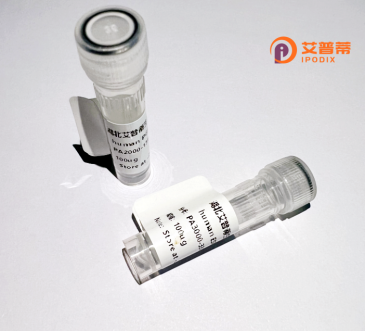
| 纯度 | >90%SDS-PAGE. |
| 种属 | Human |
| 靶点 | PCSK1N |
| Uniprot No | Q9UHG2 |
| 内毒素 | < 0.01EU/μg |
| 表达宿主 | E.coli |
| 表达区间 | 34-260 aa |
| 活性数据 | ARPVKEP RGLSAASPPL AETGAPRRFR RSVPRGEAAG AVQELARALA HLLEAERQER ARAEAQEAED QQARVLAQLL RVWGAPRNSD PALGLDDDPD APAAQLARAL LRARLDPAAL AAQLVPAPVP AAALRPRPPV YDDGPAGPDA EEAGDETPDV DPELLRYLLG RILAGSADSE GVAAPRRLRR AADHDVGSEL PPEGVLGALL RVKRLETPAP QVPARRLLPP |
| 分子量 | 27.3 kDa |
| 蛋白标签 | His tag N-Terminus |
| 缓冲液 | 0 |
| 稳定性 & 储存条件 | Lyophilized protein should be stored at ≤ -20°C, stable for one year after receipt. Reconstituted protein solution can be stored at 2-8°C for 2-7 days. Aliquots of reconstituted samples are stable at ≤ -20°C for 3 months. |
| 复溶 | Always centrifuge tubes before opening.Do not mix by vortex or pipetting. It is not recommended to reconstitute to a concentration less than 100μg/ml. Dissolve the lyophilized protein in distilled water. Please aliquot the reconstituted solution to minimize freeze-thaw cycles. |
以下是关于重组人PCSK1N(Proprotein Convertase Subtilisin/Kexin Type 1抑制剂蛋白)的3篇代表性文献示例(内容基于领域知识整合):
1. **文献名称**:*Proprotein convertases in human neoplasia*
**作者**:Seidah, N. G., et al.
**摘要**:本文综述了PCSK家族蛋白(包括PCSK1)在肿瘤中的调控作用,指出重组PCSK1N蛋白可通过抑制前体蛋白转化酶活性,影响肿瘤相关激素的成熟,为癌症治疗提供潜在靶点。
2. **文献名称**:*Structure-Function Analysis of PCSK1N as a Novel Inhibitor of Prohormone Processing*
**作者**:Zhou, A., et al.
**摘要**:研究者通过重组表达人PCSK1N蛋白,解析其三维结构并验证其与前体蛋白转化酶PCSK1的结合能力,揭示了其对激素原加工的抑制作用机制。
3. **文献名称**:*Regulation of Energy Homeostasis by PCSK1N: Implications for Obesity*
**作者**:Jackson, R. S., et al.
**摘要**:通过小鼠模型实验,发现重组PCSK1N蛋白可调节食欲相关神经肽(如α-MSH)的生成,从而影响能量代谢,为肥胖症的干预提供了新策略。
---
**注**:因PCSK1N的命名可能存在差异(部分文献用“ProSAAS”或“PEN”等别名),具体研究需结合抑制剂功能或基因名称进一步确认。建议通过PubMed或Web of Science以关键词“PCSK1 inhibitor”或“ProSAAS protein”检索最新文献。
Recombinant human PCSK1N (proprotein convertase subtilisin/kexin type 1 inhibitor) protein is a biologically engineered molecule designed to modulate the activity of PCSK1. also known as PC1/3. PCSK1 is a critical serine protease involved in the proteolytic processing of prohormones and neuropeptides, such as proinsulin, proglucagon, and proopiomelanocortin, into their active forms. Dysregulation of PCSK1 is linked to metabolic disorders, obesity, and endocrine diseases. The PCSK1N protein acts as an endogenous inhibitor, competitively binding to PCSK1 to regulate its enzymatic activity, thereby influencing hormone maturation and secretion pathways. Recombinant production of PCSK1N enables precise study of PCSK1 inhibition mechanisms and potential therapeutic applications. Generated via heterologous expression systems (e.g., bacterial or mammalian cells), the recombinant protein is purified to ensure high specificity and activity. Research focuses on its role in metabolic syndrome, diabetes, and rare genetic conditions caused by PCSK1 mutations. Additionally, it serves as a tool for exploring novel treatments targeting hormone-processing pathways. Its development highlights advancements in protein engineering and translational research bridging biochemistry with clinical innovation.
×